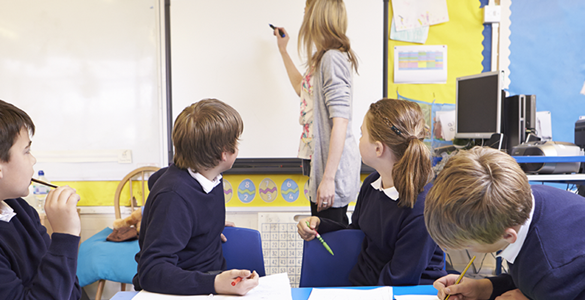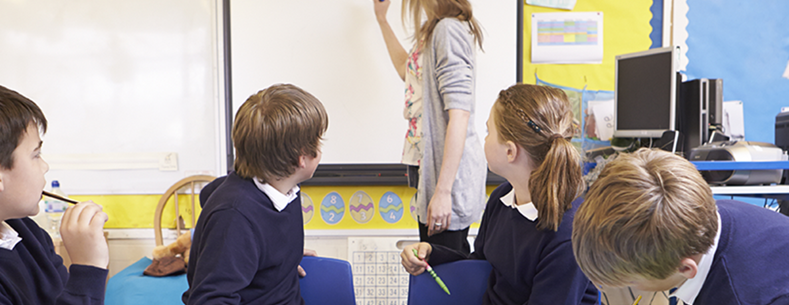With the development of a new Curriculum for Wales well underway, ahead of its planned introduction from September 2022, there has been a lot of attention on how schools will be held accountable under the new curriculum and how their performance will be measured.
The Welsh Government is currently developing a new school accountability system and published its draft arrangements for school evaluation and improvement in February 2019. The Minister for Education, Kirsty Williams AM, told Assembly Members in Plenary on 10 July 2019:
The new evaluation and improvement arrangements will help bring about the cultural change that is ultimately needed to support the realisation of our new curriculum.
Separating school accountability from pupil assessment
The Welsh Government has emphasised the difference between assessment for pupils’ learning and progression, and accountability tools used to measure schools’ performance. It published its proposals for assessment (PDF 1.09MB) under the new curriculum separately (alongside the draft curriculum materials in April 2019) to its draft school evaluation and improvement arrangements.
The Welsh Government has been working towards an ‘Assessment and Evaluation Framework’ since it was recommended by the Organisation for Economic Co-operation and Development (OECD) in 2014 (PDF 3.57MB) and 2017 (PDF 2.91MB), with the Minister referring to it in these terms as recently as September 2018 (para 147). However, this has since evolved into two separate policy spheres:
- individual pupil assessment to support their progression; and
- evaluating schools to support their improvement and make them accountable.
Asked whether there is now a ‘thick black line’ between the two concepts of assessment and accountability, the Minister for Education told the Children, Young People and Education Committee on 18 September 2019:
Yes, absolutely. I think some of the trouble that we've got ourselves in previously is because there has not been a clear distinction between assessment and accountability, and, when you start using assessment for accountability purposes, that's when, potentially, that assessment process gets corrupted and you have gaming.
The Welsh Government (through regulations in 2018) has ended the publication of teacher assessment data and national reading and numeracy test results at school, local authority and consortia level. This means that a school’s pupil outcomes are no longer published prior to their external examinations at Key Stage 4.
For further information on how the Welsh Government is seeking to use assessment to inform teaching and learning, rather than for school accountability purposes, see our previous articles of 7 January 2019 and 23 May 2017.
A shift towards self-evaluation and an evolving role for Estyn
Self-evaluation is an increasing feature of the Welsh Government’s approach to school improvement and school accountability, influenced by the OECD’s observations that effective self-evaluation by schools is a prominent feature of high performing education systems around the world. Estyn and the OECD are developing a national self-evaluation toolkit for schools (to be known as the ‘National resource for school improvement’).
Professor Graham Donaldson’s review in 2018 foresaw a greater role for Estyn in supporting school improvement (in addition to its current emphasis on providing assurance and accountability). There will be a partial suspension of school inspections in 2020/21 to enable Estyn to engage with preparations for curriculum reform, although it will continue monitoring schools causing concern.
Estyn will resume its routine cyclical inspections from September 2021 under a new inspection framework. In the longer term, as advocated by Professor Donaldson, Estyn plans to move towards a validation model of inspection on an ‘earned autonomy’ basis from 2024, whereby schools with a proven ability to conduct and act on self-evaluation would not need to be inspected in the same way as at present. Meanwhile, it has recently been reported that, due to concerns about potential decline in the absence of inspection, Ofsted is to resume inspections of schools in England previously judged as ‘Outstanding’. Since 2011, those schools have been exempt from inspections.
The proposed school evaluation and improvement arrangements
The draft arrangements for school evaluation and improvement, published in February 2019, are based on the following cyclical process:
- Self-evaluation: Schools will use the national self-evaluation toolkit and local authorities, regional consortia and the Welsh Government will self-evaluate against Education in Wales: Our National Mission priorities.
- Planning for improvement: Outcomes of the self-evaluation process to inform schools’ School Development Plans.
- Published summary of priorities and implementation plan: School Development Plan priorities published.
- Authentication: Regional consortia to authenticate the school’s self-evaluation to demonstrate it is a true and accurate reflection of the school’s strengths and areas for development.
- Inspection: Validation through inspection and regulation.
The Welsh Government has said (PDF 453KB) that the national school categorisation system, which assigns schools a colour category based on their performance and the level of challenge and support they require, will remain ‘for the immediate future’. However, the Minister told the CYPE Committee on 18 September that categorisation ‘will continue to evolve’ as it has already under the developing approach to how school performance is measured.
The Minister said the direction was ‘about better accountability, smarter accountability, not less accountability’, adding:
We're moving to a system of schools as learning organisations, and a greater emphasis on self-evaluation, with external verification of that by Estyn, our inspectors. (…)
The ultimate system that we're going to get to and the ultimate arbiter and the part of the system that provides public assurance and public confidence ultimately ends in Estyn. But it starts with our teaching standards and the professionalism of individual members of staff. That's where it starts, and it ends in Estyn.
School performance measures
The accountability system under the new Curriculum for Wales will require a new suite of pupil-level school performance measures.
In May 2018, the Welsh Government announced interim school performance measures to take effect from academic year 2018/19 onwards. These are designed to address unintended consequences of the previous Level 2 threshold measures, which prioritised the grade C/D borderline and arguably provided little incentive to schools to support learners to achieve the highest grades possible.
The Welsh Government has also sought, following a review by Qualifications Wales, to address excessive and inappropriate early entering of pupils for examinations. From 2019, only a candidate’s first result counts in a school’s performance measures.
The interim arrangements are set out in full in Welsh Government guidance. They include a revised ‘Capped 9’ measure, which takes learners’ best nine results, three of which must include English/Welsh, Maths and Science GCSEs, and generates an average for the school. A higher points score is given for a grade A* than an A, for a grade A than a B and so on. Other measures schools will be expected to self-evaluate against include the performance of pupils eligible for free school meals (eFSM), boys and girls, and pupils of all ability ranges. The Welsh Government’s intention is that the performance of ‘every learner counts’ in how schools are measured.
The School Performance and Absence Targets (Wales) Regulations 2019 (discussed in Plenary on 10 July 2019) reflect these interim arrangements, removing the requirements on schools to follow the Level 2 threshold targets (5 or more A*-C GCSEs). Instead, from 2019/20 schools are required to set six non-specified targets based on their own self-evaluation until long-term school accountability arrangements are in place.
What next?
The Welsh Government has said (PDF 453KB) that in the next few months it will commission independent research to review the performance measurement system and consult with schools and key stakeholders, to inform the development of new performance measures to go alongside the new curriculum.
Article by Michael Dauncey, Senedd Research, National Assembly for Wales






